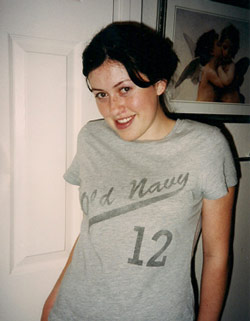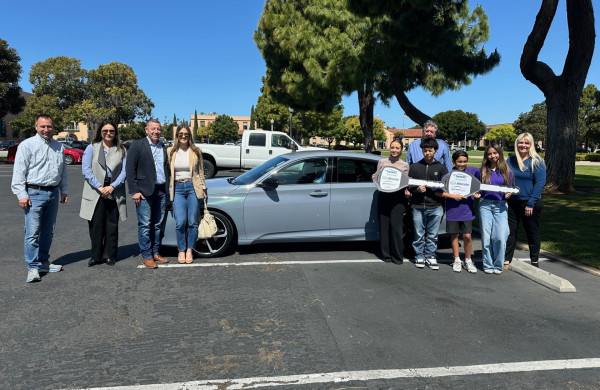DUE TO THE GRAPHIC NATURE, DISCRETION IS ADVISED
“Hmm,” said the doctor under his breath, his eyes scanning 9-year-old Elaina’s jaw, his fingers on both tips by the neck. “That’s going to have be operated on.”
Over the next several years, Elaina watched the doctor’s prediction come true. She was now 18 years old with a severely protruding jaw that not only gave her a profile she didn’t like, but made it nearly impossible to chew. Her teeth had grown so out of alignment that in order to eat meat she would have to press it against the roof of her mouth and with her tongue and her might, she would squish it down into a swallowable size. It was exhausting. It made her whole face hurt.
 Elaina before surgery.
Elaina before surgery.The surgery to repair her jaw consisted of a few other adjustments that, while routine for the maxillofacial surgeon, weighed heavily on Elaina’s heart. To achieve the desired profile and functionality, her jaw would have to be shortened and moved backward, her palette below her nose would have to be pulled forward and her nose tilted slightly upward.
After the surgery, as Elaina was being moved from the operating room, the fog of the anesthesia was starting to lift and her first moments of lucidity brought to mind an overwhelming sense to vomit. Elaina began to heave and then throw up through teeth that were wired shut. The full contents of her stomach had nowhere to go causing an emergency in the hospital hallway as they tried to save her from choking to death. “I can’t breathe,” she thought. “I’m suffocating!”
As the doctor and staff tended to her, they interpreted her panic as a need for sedation. It was the worst decision they could have made.
As the doctor and staff tended to her, they interpreted her panic as a need for sedation. It was the worst decision they could have made.
Putting Elaina back under sedation meant that she was unable to communicate—and she had one thing she urgently needed to communicate: she wasn’t getting any air.
“Elaina, calm down! You’re going to have to calm down!” she heard them yell. Over and over, her body jerked and pulled and wrenched as she tried to fill her lungs with air. They gave her a white board. “CAN’T BREATHE!” she wrote. “HELP! PLEASE! THIS NOT RIGHT!”
“Keep her sedated,” the doctor ordered. “You just need to calm down, Elaina!”
Next came a chorus of, “settle down, stay calm, deep breaths,” from staff and her parents, all trying to convey that they knew the answer to her problem. They were all dead wrong.
“Is that why I can’t breathe?” she began to wonder to herself. “Is it because I can’t calm down?”
The answer—the one nobody knew yet, was no. During the operation, the doctor had inadvertently pierced her nasal cavity causing it to swell shut. What made it worse was that all the swelling was causing abnormal amounts of mucus. The crying didn’t help either. Elaina’s ability to breathe had been reduced to an air passage the size of a small stirring straw. And nobody had any idea.
With her tongue pushed to the roof of her mouth and held there with a splint, her teeth wired shut, her face in agony and an inability to talk or breathe, Elaina began to think she wasn’t going to make it. Imagine being in a room full of people and nobody knows you’re dying but you.
What came next was a mix of panic, fear and anger that exploded on anyone who came near. She became like a girl possessed. The nurses approached in fear as Elaina began kicking over her bed table and throwing bedpans and anything she could reach—including food at the nurses.
Four days later, she was sent to her parent’s home with a suction tube, oxygen mask and a yet to be detected broken nasal cavity. It was the sweltering August of 2004. To say she was miserable doesn’t come close to describing her emotional state. Her parents propped her up on the couch before a TV and a fan and she lay on the couch trying to convince herself that the trickle of oxygen passing through her nose was enough to sustain life. The fan staring back at her said ‘no’ with every back and forth of its oscillating head. Without oxygen, she had almost no energy, her lungs felt like knives in her chest from trying to grasp air and her head was constantly light, to the point of driving her crazy.
Then she got an idea. The suction tube placed up her nose felt good as it took mucus out of her nasal cavity. So what if she jammed it up there—way up there, would it bring increased relief? Inch after inch was forced up her nose to the far ends of her cavity and it felt good, really good. All day she would push the full length of the tube up her nose and suction.
But there was a problem. She was irritating the lining of the nasal cavity causing it to swell even further. Nights, when she was supposed to be recuperating, were spent in exhausting torment.
One morning she stumbled into the bathroom and looked in the mirror and took particular focus on her eyes, the only feature on her face that looked familiar. She looked even closer. “Stay alive, you have to stay alive,” she begged the girl behind the eyes. “Commit to me that we’ll stay alive until tomorrow!”
“Stay alive, you have to stay alive,” she begged the girl behind the eyes.
Getting back to the couch was her next goal. It took two minutes for the 10-second trek. Suddenly, her grandmother burst in the house greeting Elaina with the kind of false cheeriness reserved for awkward situations such as this.
“Good morning, sweetheart! How are you?” Elaina gave no answer. “Elaina, I think I left my red purse here the other day, have you seen it?” Elaina hadn’t seen it and didn’t have the energy to answer even if she had. “I’m sure I left it here, I just know I did,” grandma said as she turned things over and looked here and there. She was busy searching for her red purse, talking all the while and as she did, it occurred to Elaina that somehow, even though life had stopped for her, it was moving forward for everyone else. Though she lay dying, the world was going on even right under her painful nose. It made her feel even more muzzled than before, more invisible, more isolated.
She laid her swollen cheek against the edge of the couch, feeling the pain, even pressing into it. Suddenly, the brand new dog her mom had just gotten came up to her and started sniffing around. It found something it liked. It began to lick the blood from her gums. Elaina, drained of all energy, could not move away. The dog feasted on the blood, endlessly licking her mouth. Streams of tears rolled down Elaina’s face. “I’m in hell,” Elaina thought.
The days and nights that passed were not so much an accumulation of seconds and minutes, but weak inhales and exhales—each extending her life by another few agonizing moments. Her energy was divided into two areas: to get her through the struggle of each exhausting breath—and the constant mental coaching it took to convince herself that she was going to make it. Just one more breath, Elaina, she told herself. One more breath is all you need to live. You can do it. This went on for days.
Two weeks had passed and there had been no improvement. Her face still felt like a basketball filled with water. Surely, with a full fourteen days behind her, the swelling would begin to subside. But it didn’t. She began to wonder if she had it in her to fight much longer.
She began to wonder if she had it in her to fight much longer.
Day 21 arrived and breathing was still her only thought and pursuit. Any day now, she told herself. Relief has to come any day.
Day 28 proved to be just as bad as day 1. Elaina’s mind was battling her body for control. She had been carrying on the fight for nearly a month and the urge to panic was gaining strength with each passing minute. If sanity was a large drinking glass, panic was a poisonous fluid just about to spill over the top. She looked around. Is it going to be now? she asked herself. Can I hold the panic off any longer?
Just then, she grabbed her hair and began to pull. She kicked at anything that was near and her twisted body writhed on the ground. Her face turned red under the already bruised purple and yellow. She had reached her limit—and the dam of self-control burst open. She was going to save her life, and she was going to do it now. She made it to the kitchen, where her mother was and wrote frantically on her white board what she wanted her mom to do.
“I can’t cut them off, Elaina, the doctor says your jaw will fall off!”
“Now!” wrote Elaina, her body language showing that she was more interested in a fight than a conversation. “Or I swear I’ll do it myself!”
Her dad walked in the house and saw that his daughter had turned into an animal, but quickly took her side against his wife. He had had enough of sitting by while his daughter suffocated to death. Mom and dad screamed at each other as Elaina waved her hands and motioned support for her dad’s position.
Finally, mom and dad took the conversation into the bedroom and Elaina, adrenalin coursing through her body, stumbled into the garage to look for her salvation. She opened 20 drawers before she found it.
Arriving at her parent’s bedroom, she burst open the door and started slamming the walls with the wire cutters she had just found. “All right, Elaina!” her mom screamed as she wrestled the wire cutters from her hand. “I’ll call the doctor!”
Elaina had won the moment. Her mom called the doctor and the appointment was set. But she would still have to wait before getting her chance to breathe. She was still seething like a caged tiger when her mom asked her to lay down. Her mom reached onto a shelf for something to read, anything. She grabbed a hold of an old dusty book and opened it up. She read to distract, she read to drown out the sound of her daughter gasping for air, she read because she was a mom who loved her daughter and she was completely out of answers.
Immediately Elaina felt something come over her.
She felt peaceful. Her nostrils opened. And her lungs slowly but surely filled with intoxicating oxygen. Big, giant gulps flooded her lungs that made her half-closed eyelids flutter and the corners of her mouth curl upward. Her chest rose up and down, higher and higher, and slower and slower. She began to fall asleep.
Quietly and slowly, mom put the dusty Bible—the very one the family hadn’t seen or used in 20 years—back on the shelf and stood in amazed silence as she tried to figure out what had just happened. She can breathe, she thought. Why can she breathe? She made a long, slow lean toward her daughter, risked a soft kiss to her forehead, then positioned herself in the room to simply watch and listen to the beautiful rhythm of Elaina’s lungs.
Mom put the dusty Bible back on the shelf and stood in amazed silence as she tried to figure out what had just happened.
The day that Elaina and her mom arrived at the doctor’s office, he was dead set against cutting off the wires. But even he was no match for Elaina’s determination. “I’ll cut them off myself in the middle of the night and you’ll have to rush into the emergency ward. You ready for that?!” she wrote.
He cut the wires and removed the tongue splint. Elaina’s jaw didn’t fall off. Her mouth opened slightly, just enough to let some air rush in. It wasn’t much, but it was enough. Elaina cried from the pain and the delicious taste of life.
As the days went by, Elaina could not seem to gain deep breathing. All breaths were short and deeply unsatisfying. Doctors whom she visited told her she had Post Traumatic Stress Disorder and that she would struggle with it for the rest of her life. Medication, they said, lots of medication.
Elaina cried from the pain and the delicious taste of life.
She wasn’t going to need it.
In the weeks to come, Elaina’s mom had been invited to church by a friend and felt obligated to attend, but didn’t want to be alone among all the strange, hand-raising Christians. She asked Elaina to go with her. Elaina begrudgingly said yes.
On the morning they were to attend the church, Elaina pulled herself from bed, short breaths and all. Entering the church, the music was a bit off-putting and the people seemed a little too enthusiastic. Elaina thought it was all a bit weird, but did think it was peculiar that in the middle of its weirdness there was something slightly enjoyable about it. Then a man with board shorts, a Hawaiian shirt and a Bible took the stage, and suddenly nothing was the same. The pastor spoke about Jesus and Elaina became transfixed and wide-eyed. Peace like a steady, cool mist descended upon her. She could breathe again; deep, lungs-filled inhales and effortless exhales. It felt so good, everything felt good. For Elaina, it wasn’t that she was hearing the Word; she was inhaling it. The longer he spoke about the loving Savior, the deeper the calm, the longer the breaths. The trickle had become tidal.
Whether she was hearing her mom read from the Bible or the pastor speak about Jesus, the Holy Spirit had an enchanting effect on Elaina. Her lungs responded like a rose to the first morning rays.
She returned to the church every chance she could get—Sundays and weekdays. Again and again, the Holy Spirit was there to course through her body and restore her breathing and along the way, begin to restore her soul. She wanted this God and for the mere asking, she received Him.
She went back home to the shelf and found that dusty old Bible. And with a large, holy puff of air, blew away the dust.
Was this ordeal the only way God could get her attention? Perhaps her difficult life prior to knowing Jesus meant she had already been suffocating for a very long time. Was it worth all the pain? The simple answer is yes.
She laid down on her bed and breathed deep, raised her hands and thanked her Savior. And breathed deep again.
Elaina’s diagnosis of life-long Post Traumatic Stress Disorder never materialized. Today, she is a children’s ministry coordinator at the Rock.




